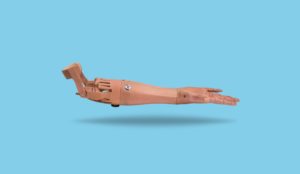Affordable bionic arms from Rhinebeck firm reach users nationwide
As a teenager, Unlimited Tomorrow CEO Easton LaChappelle had a keen interest in robotics, but it wasn’t until he had an unexpected encounter at a science fair that he realized where he could apply his skills to help those in need.

“He wanted to start the company when he was 17 and had to wait,” said Jennifer Barbic, vice president of marketing for the Rhinebeck firm. “He wound up entering a robotic hand into a science fair back in 2012 ”” I think he was 14 at the time. He wound up meeting a young girl, got to talking with her parents and found out that she was wearing an $80,000 prosthetic arm, which was, for all intents and purposes, just something that could open and close ”” very basic.
“When he compared her device to what he had created, he was just totally blown away,” Barbic continued. “That chance meeting kind of altered the course of his life. From that point on, he decided that he wanted to do better for that child and the millions of others, children and adults around the globe, that don’t have access to good prosthetic options.”
LaChappelle started developing the technology out of his bedroom in his parents”™ house in Colorado, using 3D printers to create his bionic arm prototypes. He even presented one device at the White House in 2013, where former President Barack Obama shook hands with the prosthetic.
Millionaire author and speaker Tony Robbins took notice of LaChappelle”™s work, and supported him in launching the company. This led them to set up shop in Rhinebeck; Barbic noted that they hope to remain there long-term for its proximity to the nearby cities of New York and Boston, along with talent and resources.
After several years of research and development, the firm — which now numbers about 20 employees — launched its bionic arm, TrueLimb, over a year ago.
“The company really has remained focused during that entire time on upper limb prosthetics,” Barbic said. “But what really has enhanced the scope has been the technology that has evolved, specifically 3D printing. And we are now able to create incredibly durable prosthetics that can be manufactured quickly.”
The company”™s 3D printing manufacturing method allows the limb to be lightweight, durable and completely customized to the user, who obtains the limb through a totally remote process.
Unlimited Tomorrow sends a 3D scanner to the patient, followed by more materials to assure the correct fit. After that, the patient receives the limb and it”™s ready out of the box.
Barbic said companies like Warby Parker inspired the direct-to-consumer approach as a method of keeping costs low.
Affordability is a main priority of Unlimited Tomorrow. The TrueLimb costs just under $8,000, whereas other bionic arms can run from $20,000 to $100,000, with potential additional costs. The company also offers upgrades for children outgrowing their limbs for 50% off.
“It’s always been our mission to really provide the highest quality device at the lowest possible cost to our users, and TrueLimb is the first all-in-one prosthetic arm solution,” Barbic said. “What I mean by that is that Unlimited Tomorrow manufactures the entire device from socket to fingertip, and the headquarters facility is here.
“The difference between that and other prosthetic devices,” she continued, “is that typically different components of the arm itself and the socket are manufactured in different facilities and then assembled in (another) different facility.”
Manufacturing everything together “also helps to keep the cost way down,” Barbic said.
The remote process makes the product available to anyone in the country, regardless of location or access to health centers, medical care or limb difference specialists.
“In terms of functionality that our device doesn’t have that others have, I mean, there’s really, nothing comes to mind ”” we kind of check all the boxes from that perspective,” she said.
The device uses data analytics to constantly improve performance and help TrueLimb’s development team understand how it functions in the real world so that it can be improved. It is controlled intuitively with 36 ultra-precise sensors and provides vibrational cues to give users a sense of touch.
Besides the U.S., TrueLimb recently launched in Canada, which Barbic considers the first step in a larger strategic global initiative. According to Barbic, only about 5% of the world’s amputees have access to prosthetic devices, something that Unlimited Tomorrow is hoping to change.
It is also starting to forge partnerships with children’s hospitals and independent providers to expand to a client base who may be more comfortable with in-person visits and working directly with a doctor or care provider in the process.
“At this point we’re able to print and send out in the double digits every month and we just continue to expand,” she said. “A couple of different partnerships are on the horizon, so it’s growing and it’s just incredible to see how many leads and devices are coming in and going out every day.”